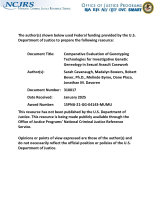Cost-Benefit Analysis of Kinship Testing Involving Siblings
This webinar aims to improve the knowledge on kinship testing involving siblings, and provides a cost-benefit analysis of practices involving the use of additional reference siblings and substitution of half siblings for full siblings in kinship tests.
This webinar was presented by the NIJ Forensic Technology Center of Excellence on March 7, 2018.
See the YouTube Terms of Service and Google Privacy Policy



